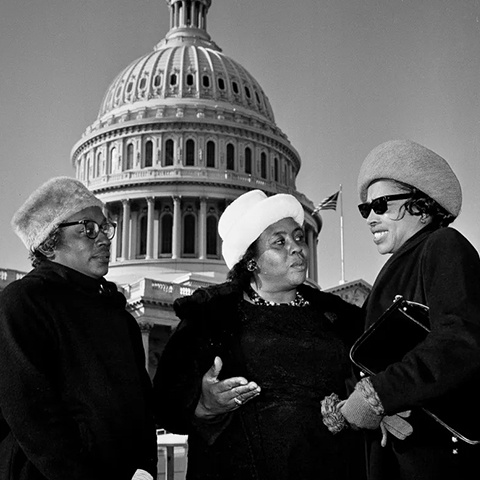Activist Ndaba Mandela Inspires Students to Take Action
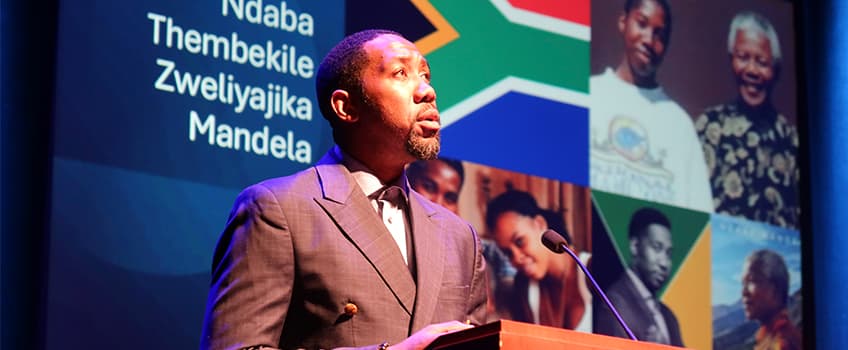
Ndaba Thembekile Zweliyajika Mandela was the 21st keynote speaker for the Fannie Lou Hamer Human & Civil Rights Symposium on Tuesday, Oct. 8.
Galloway, N.J. – The first time Ndaba Mandela met his grandfather, he was 7 years old and had just completed a 12-hour trip from Johannesburg to the Eastern Cape of South Africa.
The 21st keynote speaker for the annual Fannie Lou Hamer Human & Civil Rights Symposium at Stockton University was told by his parents that his grandfather — Nelson Mandela, an internationally recognized activist and opponent of South African apartheid — was under house arrest.
As a child, he didn’t understand the reason behind his grandfather’s captivity or that he was in trouble at all — just that the nice mansion that he was currently resting and being fed in after a long trip had a kind man who undoubtedly spoiled him.
Who could blame the child for turning to his parents and quipping, “When I grow up, I want to go to jail too.”
This story was just one of many that Ndaba Mandela shared about his grandfather during the Oct. 8 event. A couple of years after that fateful visit, Ndaba Mandela’s father started taking university classes and decided to leave the boy in Nelson's care. He proved to be an at-times strict but ultimately very caring parental figure for him.
The audience laughed as Ndaba Mandela described a time in which he shirked one of his responsibilities and was subsequently sent to the front lawn with a blanket for a night under the stars, only to be ushered back into the house just before nightfall.
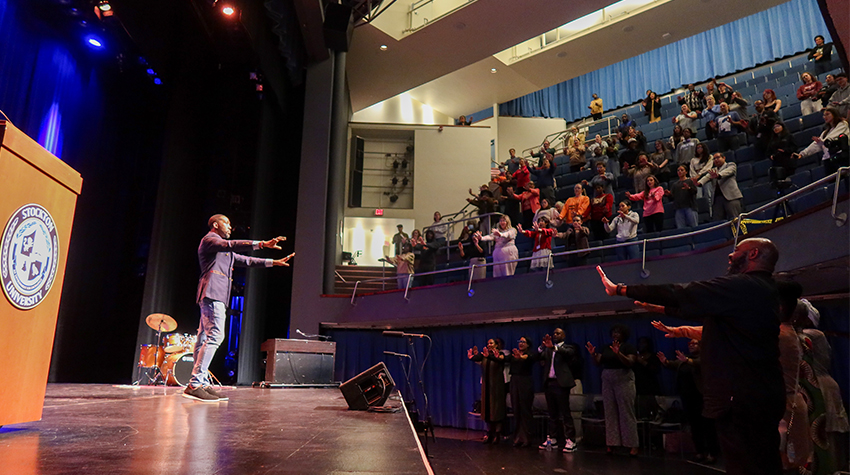
That instance taught him a valuable lesson about responsibility as a child, and it has only continued to resonate with him as an adult.
“I was about 14 when my grandfather said to me, ‘Ndaba, you are my grandson. Therefore, people will look to you as a leader, so you need to get the best grades,’ and I was like, ‘Whoa, whoa, whoa, the pressure!’” Mandela said. “Ladies and gentlemen, why do parents put so much pressure on us? It’s because they understand that we are more capable than we can ever imagine.
“That pressure is there not to make us implode but to build us. How is a diamond created? Through the exertion of pressure, right? We are diamonds, and our parents want us to shine. They want us to be a beacon of hope to others because they know that we are capable of creating and doing much more than we think we can.”
🎭 The Black Arts Movement
“And with every protest, there was music.”
And shine Mandela does — he is the co-founder and chairman of the Mandela Institute for Humanity, in which he inspires the next generation of leaders in South Africa and advocates for the eradication of HIV/AIDS, the disease that tragically took the lives of both of his parents.
Before ending his keynote, Mandela had the audience stand up and repeat these vows: “I am a leader. What I can dream, I can achieve. It’s in our hands to work together and make this world a better place.”
In addition to motivational moments, the symposium, titled "Generation Next: New Voices in the Fight for Social Justice,” honored the legacy and memory of Fannie Lou Hamer, an activist who championed voting rights for all.
In her welcome remarks, Donnetrice Allison, chair of the Africana Studies program, shocked the audience with the many ways that Hamer’s life touched Vice President Kamala Harris and her current presidential campaign. Harris was born mere months after Hamer’s famed speech before the Democratic National Convention and just weeks after Hamer’s birthday in October.
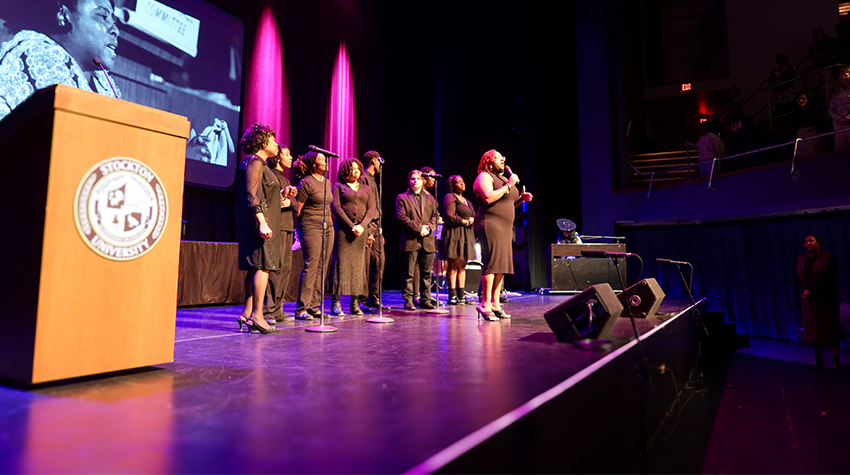
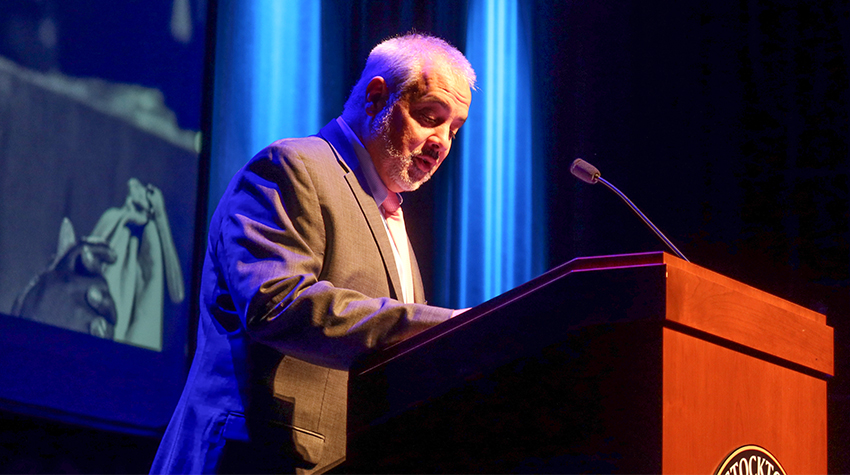
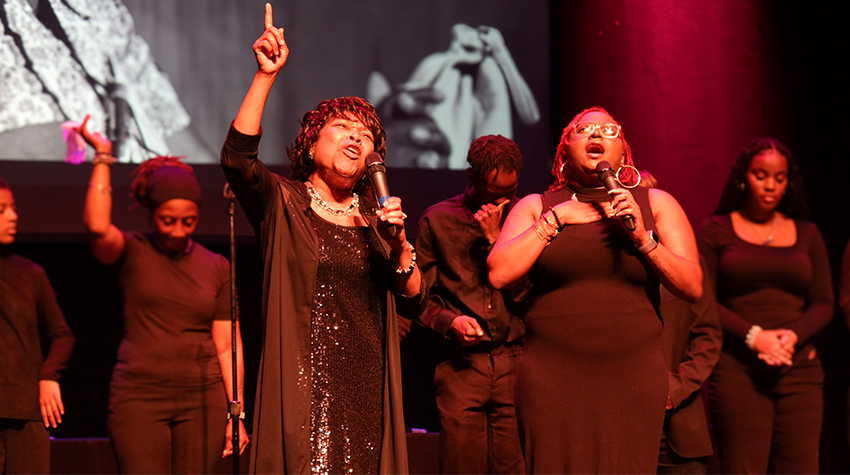
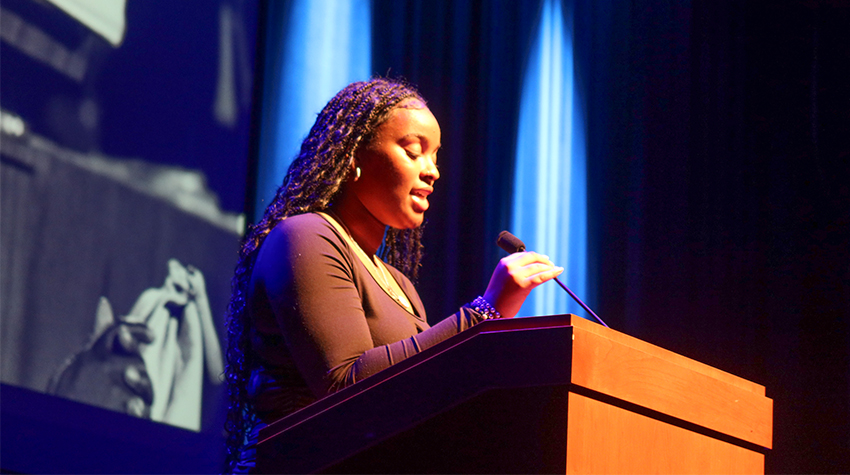
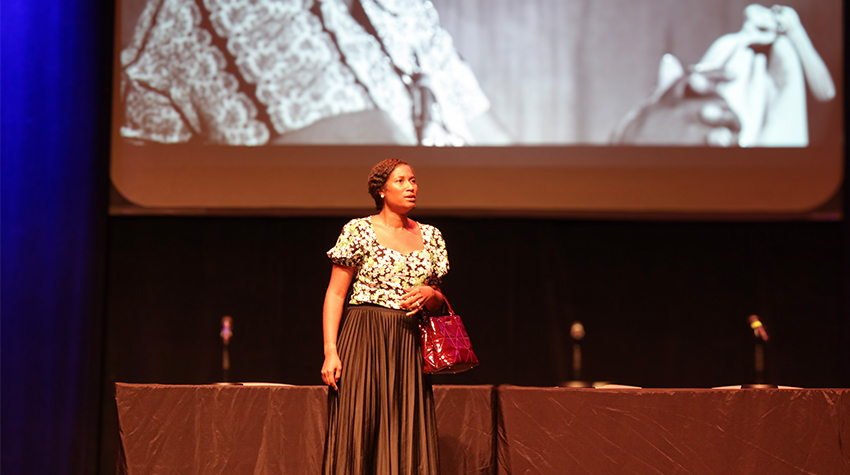
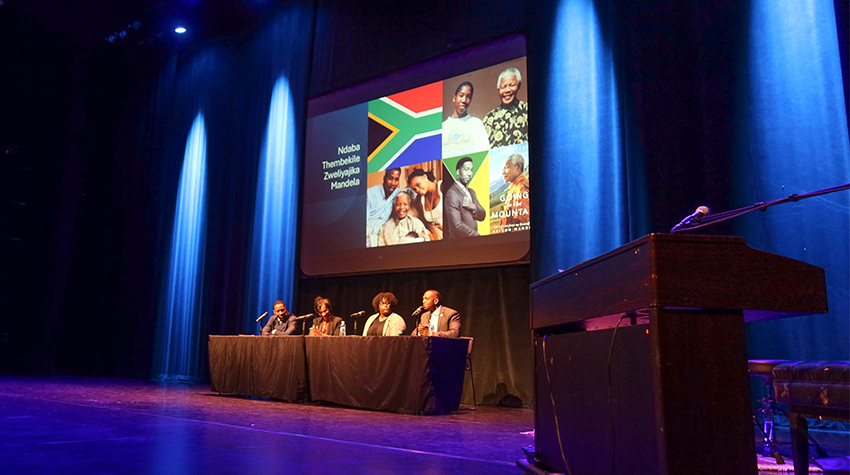
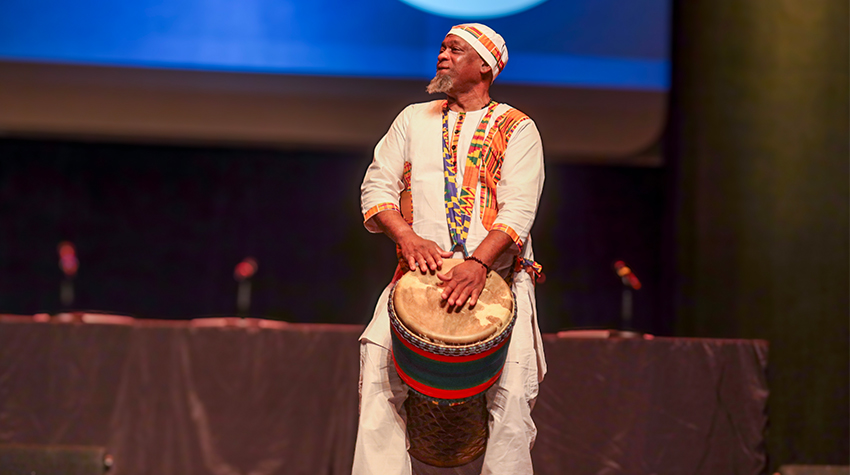
“Fannie Lou Hamer’s historic speech took place on Aug. 22, 1964. Exactly 60 years later, on Aug. 22, 2024, her wildest dream was realized when a Black woman accepted the Democratic nomination for President of the United States of America,” Allison said. “At the time of her speech, when Mrs. Hamer said, ‘I’m sick and tired of being sick and tired’ and questioned the integrity of this country, she couldn’t have imagined that this day would come.”
Ananda Earlie, public relations chair for the Unified Black Student Society, and Stockton University President Joe Bertolino echoed Alison’s sentiments and encouraged attendees to be inspired by Hamer and her persistence in fighting for the greater good.
🔑 Generation Next Panel Discussion
"We never know when our last breath will be on this Earth, so when you have the opportunity to pour into the next generation, you should use every opportunity that you have to do so. Even if you think you are young, anything can happen."
“This symposium is not just an event — it is a testament to the legacy of Fannie Lou Hamer, an advocate for social justice who inspired generations with her unwavering spirit and relentless pursuit of equality,” Earlie said. “The Unified Black Student Society and the Africana Studies program recognize that the fight for justice is ongoing and requires a collaboration and solidarity of diverse voices.”
“It’s important to remember that the significant changes that have occurred throughout history have come about through social justice and activism. When an individual or a group has the courage to speak up about injustice and fight unfairness, we move forward to a more inclusive and just society. I challenge all of us to speak up, take action, do and say something when we see injustice,” Bertolino said.
Following the symposium, the Africana Studies program collected donations through GoFundMe that will go toward the materials needed to build a well of clean drinking water for a small village in Ghana.
– Story by Loukaia Taylor
– Photos by Lizzie Nealis
20th Annual Symposium Celebrates Civil Rights, Social Justice
October 10, 2023
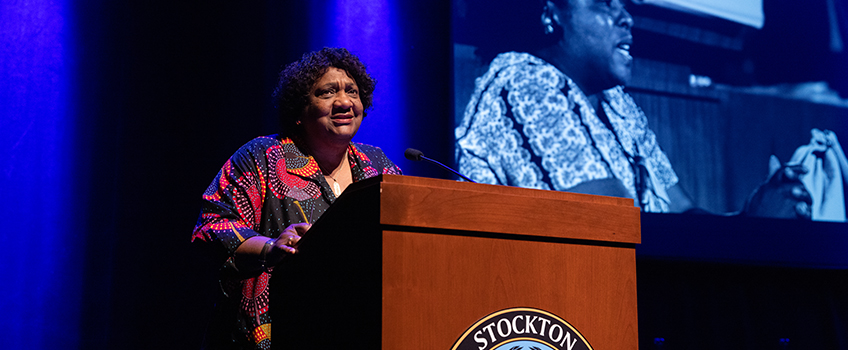
Galloway, N.J. – Following an emotional statue unveiling in Atlantic City, Stockton University continued paying tribute to civil rights icon Fannie Lou Hamer with the 20th annual Human & Civil Rights Symposium in the Performing Arts Center on Tuesday, Oct. 10.
This year’s symposium included a performance of gospel songs by the Stockton Freedom Singers, led by Beverly Vaughn, professor of Music; a video compilation of previous symposiums; poetry recitation by Stockton faculty and a keynote address by California’s first Black Secretary of State, Shirley N. Weber.
Weber’s address emphasized how much Hamer and her legacy informs how she serves the people who elected her to office. Weber, a daughter of former sharecroppers in Arkansas, said that the people who most inspired her were the people who embodied Hamer’s hope for a better tomorrow.
“So often, I'm asked by so many people, ‘Who motivated you? Who was the person that you looked up to, and how did you become the highest-ranking Black woman in elected state office in California, one of the largest states in the Union? I give them famous names sometimes, but most of the time, I don't: I give them the names of people who helped me, folks that they would never meet who remind me of the Fannie Lou Hamers of the world. Folks who said to me, ‘Little girl, you’re going to be someone when you grow up,’ and they gave me a little gift in church on Sunday because they read about me in the newspaper.
“Because I had a community that believed in me, folks like Fannie Lou Hamer who fought for us, all those kinds of things, put together somehow nullified all the negative things I had in my life. (Against) all the poverty, racism and discrimination, our family developed these buffers for us so that we grew up believing, in spite of what we had, that we could always be somebody.”
Stockton Professor Donates Fannie Lou Hamer Statue to A.C.
October 10, 2023
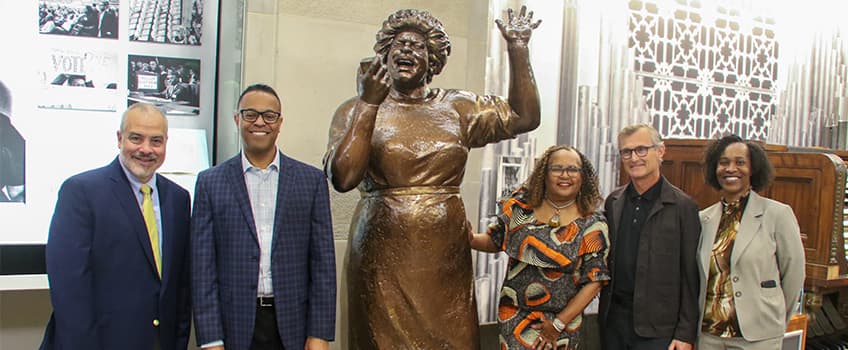
Atlantic City, N.J. — Thanks to the donation of a Stockton University professor, the legacy of civil rights leader Fannie Lou Hamer has been permanently enshrined in the place where she changed history.
An over-7-foot-tall resin statue of the woman who fought for voting rights for Black Americans was unveiled Oct. 10 during a ceremony at Jim Whelan Boardwalk Hall in Atlantic City. The hall was the site of the 1964 Democratic National Convention where Hamer made history by giving testimony in opposition to an all-white Mississippi delegation.
“It’s going where it belongs,” said Patricia Reid-Merritt, a Distinguished Professor of Africana Studies and Social Work, before the ceremony. “For all the great things and contributions that Fannie Lou Hamer made to the civil rights struggle, what she is known for is that speech in Atlantic City. It’s a tribute to her legacy and Stockton’s efforts to uplift her legacy.”
The statue is a resin mold of a Hamer statue designed by Brian Hanlon, an acclaimed Toms River-based master sculptor. The original statue was erected in Hamer’s hometown of Ruleville, Mississippi, in 2012 by the National Fannie Lou Hamer Memorial Statue Committee. Reid-Merritt was the chair of that committee, and Hanlon felt it was fitting to donate the resin statue to her.
“This statue will both educate and inspire young people here,” Hanlon said. “They should learn more about Fannie Lou. I don’t think her story is told enough. The spirit of her as a woman in encouraging other women to get involved with politics and voter rights is very important.”
More than 150 people watched as the statue was unveiled as part of the Atlantic City Experience historical display created by the Atlantic City Free Public Library. Robert Rynkiewicz, the library’s director, said the statue is an important reminder that “Atlantic City isn’t just about celebrity. It’s about history.”
60 years ago, to this day, Fannie Lou Hamer traveled from Ruleville, Mississippi, to Atlantic City and stood before the Democratic National Convention to challenge the all-white delegation representing her home state.
Her bravery was met with jeering, vitriol and even censorship as television broadcasts quickly cut off her speech from reaching the homes of the convention’s constituents. However, her plea for justice and civil rights still resounded all over the world, especially when she took her story all the way to the Capitol in order to protest the 1964 Mississippi House election in which she and the rest of the state’s Black population were barred from voting in.
People have said year after year, ‘Those people in Mississippi can't think.’ But after we would work ten and 11 hours a day for three lousy dollars and couldn't sleep, we couldn't do anything else but think. And we have been thinking a long time. And we are tired of what's going on. And we want to see now what this here will turn out like for the 4th of January. We want to see, ‘Is democracy real?’”Fannie Lou Hamer, shortly before her and the Mississippi Freedom Democratic Party made their trip to the U.S. Capitol
